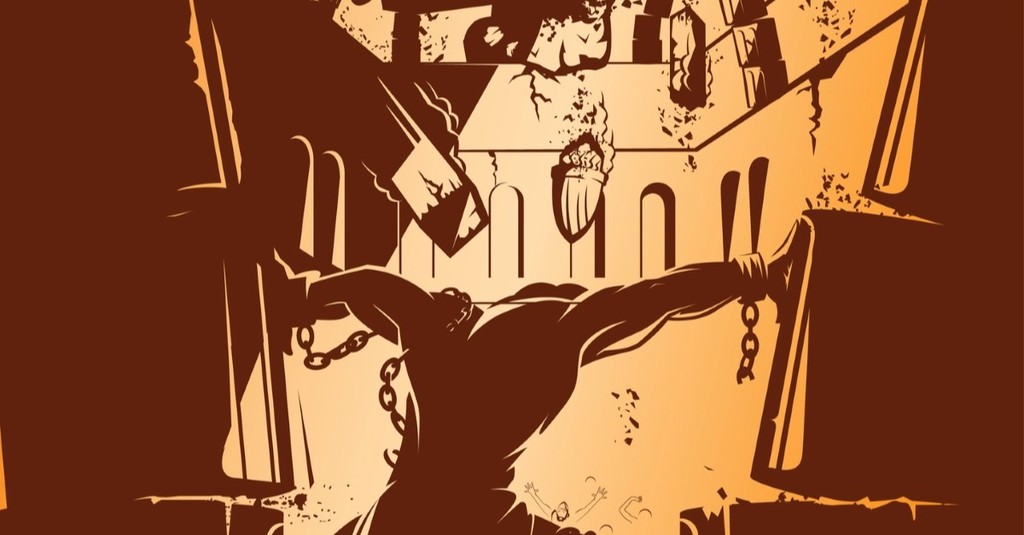
The story of Samson, the super-strong judge who loved Delilah and died killing many Philistines, is one of the Bible’s most famous stories. Given its popularity, it’s not surprising that it’s been adapted to many mediums. It’s been told as an opera, a musical, and nearly 50 movies.
Since Samson movies go back to at least 1902, it’s unsurprising that they are pretty diverse. Some present a few scenes from the Bible without much padding. Others feel like Marvel superhero movies—treating Samson as a fictional character, teaming him up with mythical heroes like Hercules. One 1962 Italian movie even featured him fighting pirates. . . then renamed the movie Hercules and the Black Pirates when it was shown in America.
Let’s look at Samson movies that follow the biblical story, each providing a different look at what we can learn from this story.
Photo Credit: © Getty Images/creativica

1. Samson and Delilah (1949)
Rating: Not Rated
Most people know Cecil B. DeMille for making The Ten Commandments, one of the most famous biblical epics ever. He brings that same style to this movie. The sets feel huge, the costumes elaborate, the acting overdone. Like every other biblical epic, it plays fast and loose with the biblical material—fortunately without losing the main moral.
The story starts with Samson as an adult, and it’s already clear that women will be his downfall. He’s courting a Philistine woman—portrayed as Delilah’s sister. So, when Samson’s Philistine father-in-law says, “Take her sister, she is more beautiful” (Judges 15:2), his refusal doubles as scorning Delilah. When Samson escalates things and the Philistines burn her family in the fields, Delilah plans vengeance. It’s embellished but makes for good drama—Matthew Page compares this Delilah to the double-crossing women in so many 1940s noir movies.
Given that every biblical epic adds subplots, the big question is not “Does it add anything?” but “Do the additions work?” Here, they work very well. The love triangle between Samson, Delilah, and her sister feels convincing and underlines a key theme—Samson is Jewish yet only wants Philistine women, even as he demolishes Philistine power.
The movie also provides some silly scenes, letting viewers know the flashy sets and overdone acting are purposefully silly. Scenes like Samson stealing clothing to settle a bet are played as comedy—and made funnier when you realize one of the men he steals clothes from has a familiar voice. He’s Arthur Quirk Bryan, the actor who voiced Elmer Fudd.
Samson and Delilah wasn’t the first movie about Samson, but no Samson movie since then has escaped its shadow.
Photo Credit: Paramount Pictures
Further Reading: 10 Classic Moses Movies You Should See
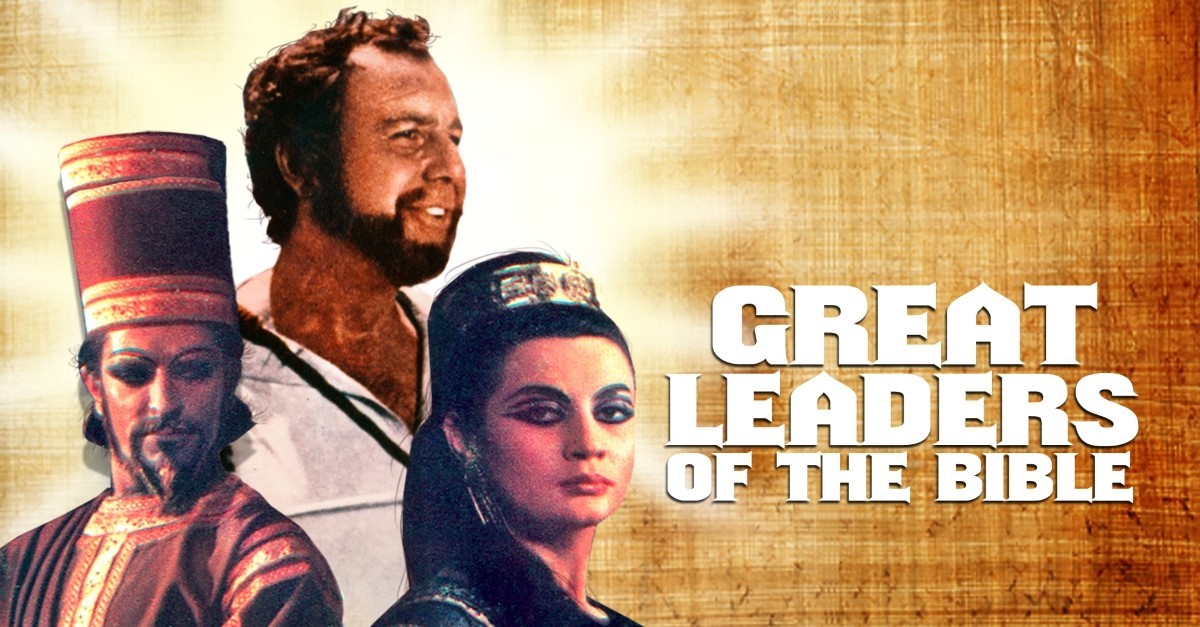
2. Great Leaders of the Bible: Samson and Gideon (1965)
Rating: Not Rated
While some biblical epics tell one person’s story and try to make it as grand as possible, others have a smaller scope. Rather than focus on the story of Samson, this lower-budget film combines two stories from the book of Judges. While Gideon and Samson may not sound similar, the movie reminds viewers they had something in common: both became arrogant and neglected following God.
The first half tells Gideon’s story, ending shortly after his victory over the Amalekites and hinting that Gideon will soon seek money and power (Judges 8:25-27). From there, it transitions to telling Samson’s story, where we more clearly see a judge forgetting his duties, and dealing with the aftermath of his poor choices.
The Samson section abridges a few details—it makes Deliliah the prostitute that Samson stays with in Gaza (Judges 16). The special effects are more limited than in Samson and Delilah, but the movie makes up for its smaller budget in other ways. It finds clever shortcuts—like having the angel who speaks to Gideon look like a normal man, chatting with Gideon before revealing his identity. Not as flashy as a winged man in golden armor appearing in smoke, but special effect angel scenes don’t usually age well anyway.
The filmmakers seen to have known how stagey and silly Bible movies can seem and decided to lean into that quality. There’s lots of sharp dialogue and darkly funny moments foreshadowing what will come. For example, when the Philistines offer Delilah money to betray Samson, they meet in the temple of Dagon. Their leader watches enslaved Israelites lift a statue of Dagon and asks a priest, “Are you sure the god statue is strong enough to support the weight of the temple?”
“It better be,” the priest replies. “If the temple falls, so will my head.”
Great Leaders of the Bible may not have the big spectacle of some other Samson movies, but it’s cleverer and funnier than anyone would expect.
Photo Credit: San Pablo Films/San Paolo Films
Further Reading: 6 Inspiring Esther Movies You Should See

3 The Bible: Homeland (2013)
Rating: TV-14
The Bible miniseries’ didn’t devote a full episode to every major biblical character, but a little over half of the “Homeland” episode tells Samson’s story.
Since the episode only spends 25 minutes of its 48-minute runtime on Samson’s story, plenty of material gets condensed. Viewers first see Samson as an adult—skipping the scenes of an angel visiting his mother, though she appears throughout the episode advising Samson. His battles with the Philistines get combined, and he meets Delilah quickly—she sees him after he’s destroyed half of her town, and they bond without it being entirely clear why.
Some viewers may complain this compact approach sells the story short. However, given how movies like Hercules, Samson & Ulysses throw out the biblical story entirely, it’s preferable to see a condensed Samson story that follows the Bible.
The episode’s narration connecting Samson’s story to the rest of the miniseries also has a particular advantage. The story makes it clear that Samson wasn’t an isolated hero—he was one of many judges who ruled Israel before the nation started having kings. His story is fun but only makes sense in the full context of Israel’s history.
A well-produced, short, action-packed look at Samson’s life.
Photo Credit: Lightworkers Media
Further Reading: Top 10 Bible TV Shows of All Time

4. The Bible Collection: Samson and Delilah (1996)
Rating: TV-14
The Bible Collection devotes two 90-minute episodes to Samson’s story, which makes for a long but never boring TV movie.
Instead of trying to outdo other movies’ special effects, it reserves the effects for the biggest scenes (Samson destroying the Dagon temple, etc.). However, director Nicolas Roeg uses some trademark editing tricks to make normally boring scenes feel exciting. The angel appearing to Samson’s mother usually feels like a long exposition scene. Here, the footage alternates between the angel talking about God giving a savior to fight the Philistines, and what the Philistines are doing elsewhere—burning fields and killing people.
The story also overcomes what gets most Samson movies in trouble. Most Samson movies follow the same plot outline as Demille’s Samson and Delilah: half the story follows Samson, the other half a Philistine villain plotting to catch him, then the two haves combine when Delilah appears. How Delilah pairs up with Samson usually feels contrived. This movie underlines how Samson was involved with several women before Delilah, even showing some mature scenes, and casting his time with Delilah as one more fling. . . which takes a sinister turn.
The movie also makes the Philistine villains and their plot more complex—Delilah is depicted as a courtesan at the king’s court, fascinated by stories about Samson’s prowess. A Philistine general who’s run out of challenges ponders how to eliminate Samson, the only challenge he’s got left. A subplot involving a Philistine prince who wants to prove himself, fighting the general’s plans because he wants to kill Samson himself, creates believable tension.
The Bible Collection: Samson and Delilah may not look as great as The Bible miniseries, but it has the best script of any Samson movie in the last fifty years.
Photo Credit: Lux Vide/Beta Film/Turner Pictures/Quinta
Further Reading: 10 Bible Movies of All Time
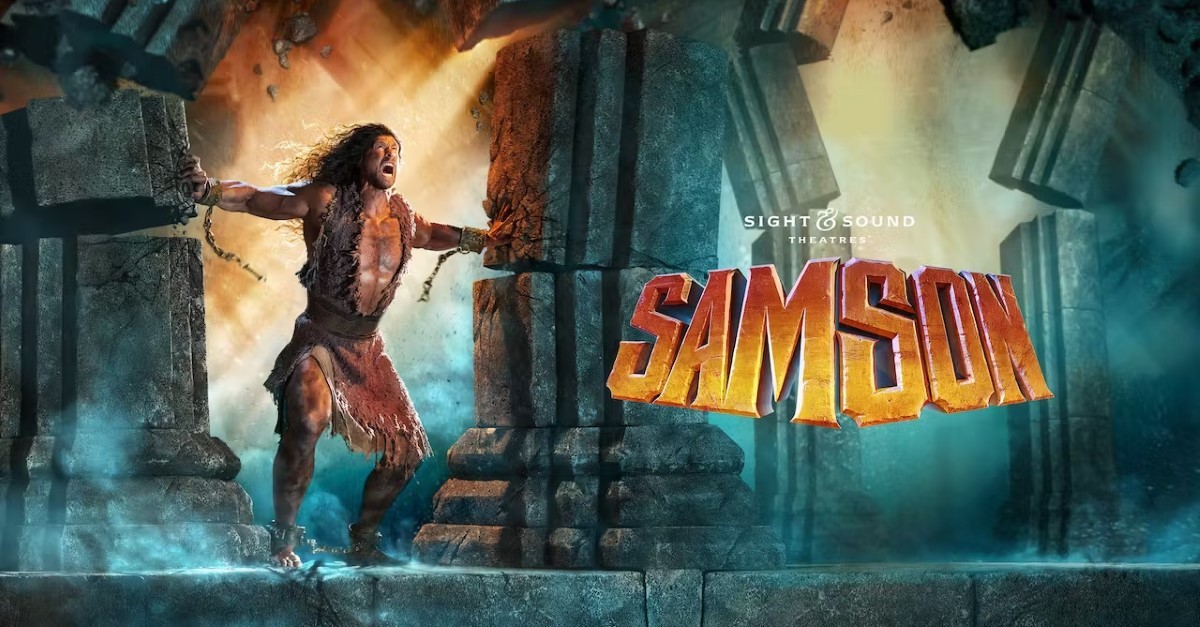
5. Sight & Sound: Samson (2019)
Rating: Not Rated
Recommended for Kids: Yes
Sight & Sound’s specialty is big theatrical productions with music, interactive moments, and a heavy dose of kid-friendly humor. The results are most exciting when seen in the theater, but their filmed shows are still fun on the small screen.
The Samson musical has all the usual Sight & Sound elements—lots of song-and-dance numbers, gleefully over-the-top acting, and a dramatic interactive scene where Samson carries Gaza’s gates off the stage and through the audience. It still feels like a stage play, and the villains’ acting goes beyond Samson and Delilah’s silliness. However, the silliness is clearly intentional, and there aren’t any gory moments to frighten small children.
Most impressive, the story avoids almost all the tropes other Samson movies fall into. Instead of focusing 0n Samson’s mother, it uses Samson’s father as the narrator—highlighting how no angel appeared to him, meaning that, like Samson, he had to follow God’s will without having any special visitation to assure him he was on the right track. The story also finds something new for Delilah—not devious, not foolish, genuinely likable, making everything sadder when she betrays Samson.
There are Samson movies with a more serious tone, but few recent ones are as entertaining and family-friendly.
Photo Credit: Sight & Sound
Further Reading: 5 Things You Should Know about Sight & Sound's Moses
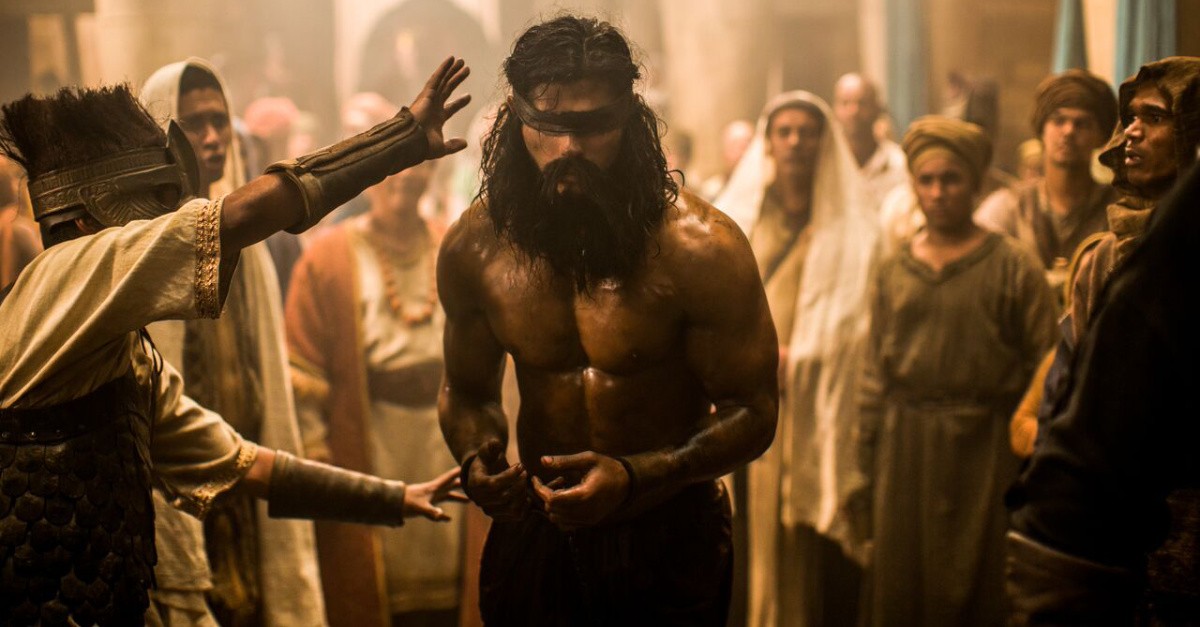
6. Samson (2018)
Rating: PG-13
After The Passion of the Christ created a new interest in movies marketed to Christian viewers, several new biblical epics followed. Most (like the campy Esther movie One Night with the King) weren’t great. The 2018 film Samson is better than some but not exceptional.
It doesn’t do much that earlier movies hadn’t already done. The acting is campy, like the 1948 movie, but without jokes letting the audience know the camp is on purpose. There are elaborate sets, decadent costumes, and exciting fights, but everything looks so fancy it seems artificial. The script uses the “jealous Philistine prince with father issues” concept but makes the villain silly rather than compelling. The script does connect Samson’s romances—giving more details about his Philistine wife and making Delilah one of her friends—in a plausible way that creates a clear emotional journey for Samson. However, the romance scenes never rise above something you’d see in a generic TV romantic drama.
On the plus side, the pace doesn’t drag. While everything looks too fancy to be real, the fight scenes look cooler than in the other Samson movies on this list. While the romance may be generic, it never becomes raunchy—meaning, as long as you skip the gory scene of Samson’s eyes being removed, the entire family can watch this movie.
So, while this movie won’t impress many adults, this may be the best option if you want something that works for everybody—nothing the kids can’t see, nothing so tacky it leaves the adults groaning.
Photo Credit: © Pureflix
Further Reading: The Samson Movie: God Wants to Give You His Strength
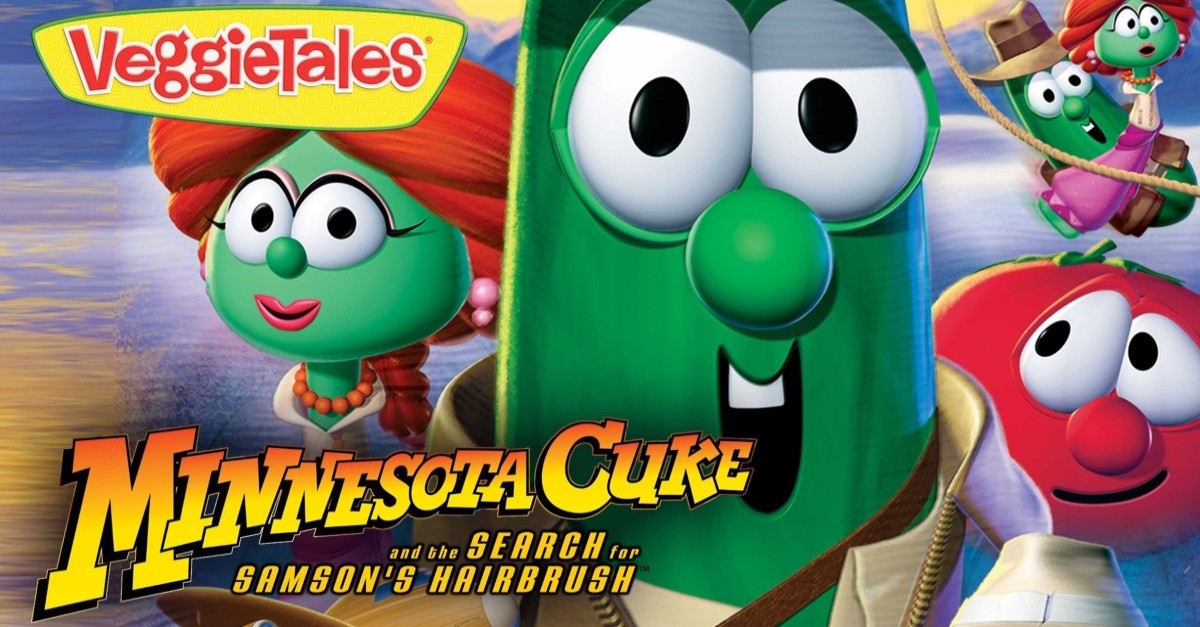
Honorary Mention: Minnesota Cuke and Search for Samson’s Hairbrush (2005)
Rating: TV-7
Not strictly an adaptation of Samson’s story, this VeggieTales episode may be the highest quality children’s cartoon exploring Samson’s life. It spoofs the Indiana Jones franchise with a story where heroes must learn about Samson’s life. Archeologist Minnesota Cuke learns that villains are seeking a relic that reportedly gave Samson his strength and rushes to find it before they can use it for devious purposes.
As with every VeggieTales story, the content is silly but captures a biblical lesson well. The characters learn that Samson’s strength ultimately came from God, and Samson breaking promises to God got him in trouble. The story of Samson is not essentially a superhero story but a tragic story about what happens when we forget to focus on God as our provider.
Terrifically fun for kids (and adults who know the Indiana Jones franchise).
Photo Credit: Big Idea Media
Further Reading: Kids Learn about Bullying in VeggieTales: Minnesota Cuke

Originally published Wednesday, 14 June 2023.
